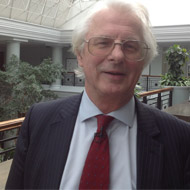Brexit – challenges and solutions

Professor The Lord (Sandy) Trees.
"Brexit has not been the cause of where we are now, it has simply focused our attention on it," suggested Professor The Lord (Sandy) Trees, speaking at the BSAVA Congress.
The current situation is a 'perfect storm' consisting of the coming together of four factors that were, in fact, issues prior to the 2016 Referendum and our present concerns about Brexit, he said. These factors are: the flatlining of undergraduate applications; graduate output that is not sufficient to replace the losses from the indigenous veterinary workforce; disillusionment with the profession leading to poor retention; and the potential loss of EU-trained veterinary surgeons.
Many potential vets are first attracted by how the profession is represented in the media. The problem is that the media do not present a balanced view of the veterinary profession, which immediately leads to the need to manage undergraduate expectations – when they arrive at vet school – as to the realities of practice life.
Lord Trees posed a series of questions. Are we doing enough to educate careers advisers in secondary schools? Are we selecting students for all the personality traits that best suit them for life as a vet surgeon? Do we actually prepare undergraduate students for the realities of veterinary practice?
Possible solutions to vet retention in practice include: keeping the EU nationals we already have; expanding veterinary practice team roles, especially those of veterinary nurses; introducing debt relief to encourage recruitment into certain sectors; providing 're-entry' incentives for vets who have temporarily left practice; and we need to have more flexible degree options for the training of greater numbers of UK vets.
Perhaps the 'corporates' could become more involved in veterinary education? Could we work more SMART-ly? We can certainly make better use of the veterinary team and the harnessing of existing and emerging technology.
Adding to the debate, RCVS president, Stephen May, posed further questions that needed to be answered. Will the mutual recognition of veterinary qualifications across the European veterinary schools be retained?
Will there be consequences following constraints on free movement? It might mean that insufficient numbers of EU graduates can be permitted entry into the UK to maintain the UK veterinary workforce. This would have a particular influence on the meat industry and a 'knock on' effect on general practice.
Concluding, Lord Trees said that although many of the factors involved long-term solutions, one simple, short-term measure is to find ways of retaining the practising vets we already have.



 The latest
The latest